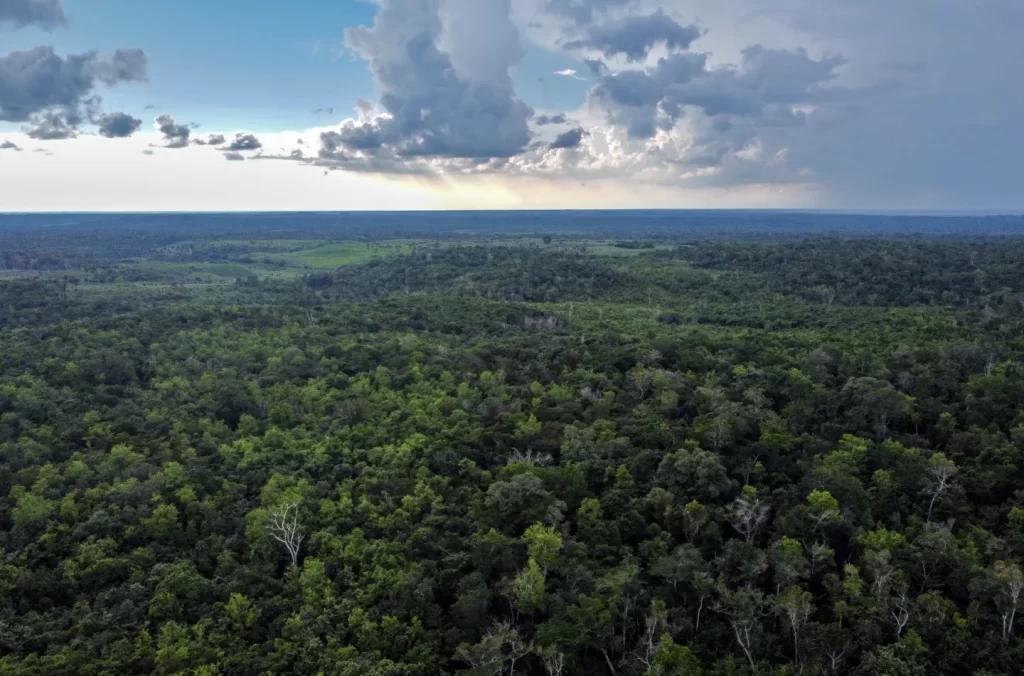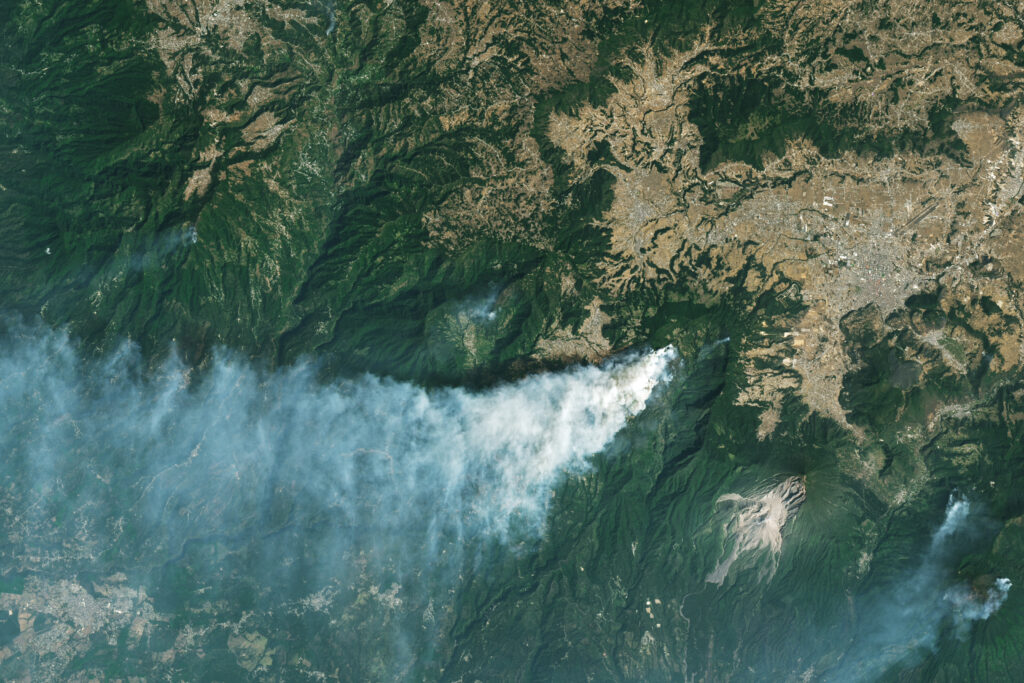Writing about burning forests, only to the blood on the soil.
When I set out to work on my R&D Group play, I was interested in using theater to figure out why it was so hard for people in Guatemala (including my family) to agree on what was the cause of the historic 2024 Fire Season in Guatemala. There were a lot of rumors that the fires were started by the newly-elected president to grant himself emergency powers, or by people trying to destabilize him, meanwhile scientists and conservationists also agreed that the fires were the clearest sign that conservation is “fighting a battle when we have lost the war.” The militaristic language that my interviewee used was quite fitting because, as I explain below, I began writing about one depressing subject –fires in previously unthinkable places, forests that have historically been too humid for wildfires– only to land in another –the Guatemalan Internal Armed Conflict, which impacted the Guatemalan forests and jungles.
The play became heavy really quickly, and I would be lying if I said it did not cause me a lot of anxiety to write it (let alone correspond in a timely fashion with the people who graciously gave me interviews, which I failed to do). But on the other side of this really difficult exercise, I found a succinct way to articulate why I write eco-plays and what eco-plays can do while the world is literally on fire. They can help undo some of the damage caused by the political imaginations that produce extraction through what I call “theatrical unnaturalism.” What is theatrical unnaturalism? A refusal to treat nature as a symbol on stage or screen, a recognition of the complex footprint of eco-storytelling, and a decomposition of the basic tenets of how nature has been symbolized and imagined over the 20th century, especially in the Global North.
Assumptions About Nature
A good number of nature documentaries and eco-plays work under the aesthetic assumption that the act of consuming them –on screen or stage– is somehow “separate” from the issues themselves. For example, by watching David Attenborough narrate the peril of the oceans in his latest special, you –the viewer– are knowing and feeling something about the ocean –nature– because of the content of the documentary. This knowing and feeling something shapes your relationship to nature (usually by learning about the particular natural phenomenon, and learning what you can do to protect them) is the best (most efficient, most impactful, or most direct) way for that piece of media to be ecological. Likewise, by watching a play like, say, Ibsen’s An Enemy of the People, you might know and feel things about scientist Thomas Stockmann who knows something that politicians can’t see –bacteria– who is ultimately wronged because his discovery may bring financial ruin to his town. It sure helps when Jeremy Strong –of Succession fame– wins a Tony for his portrayal of this wronged scientist Dr. Stockman.
The assumption that the content of these documentaries and plays is the primary means by which they can be ecological is… exactly that, an assumption. And because it is an assumption, it can inadvertently obscures what it takes for granted: 1) The very material reality that watching a piece of media –live or on screens– leaves a material footprint. (I promise I am not going to ask you to recycle your playbills later in this essay) and 2) that the very “nature” that these plays and media present has already been imagined for us.
To illustrate my point about materiality, I offer two examples: The internet from which to stream (pun intended) David Attenborough’s documentary is connected because of cables laid at the bottom of the very ocean, and which have an impact on the Ocean as much as the impact has on them. Likewise, there is an energy and material impact on actually streaming the movie. This is of course more evident in the theater. If you saw An Enemy of the People, you could see Jeremy Strong covered in Ice at the end of intermission, as a metaphorical mob attack on his persona from the townspeople. He was covered in ice, and surely tired at the end of the performance. Storytelling is never abstract, it always has a material footprint, and in this way all stories are ecological.

And now, regarding my point of nature as being imaged for us. A more vivid example. Can you imagine David Attenborough swearing while discussing phytoplankton? “We have just discovered that ocean plankton remove almost a third of our carbon emissions.” Now imagine him saying “That is a fuckton of carbon”. Exactly. He wouldn’t. In fact, can you imagine anyone swearing in a nature documentary? What about Attenborough putting on a fabric costume to pretend that he is a whale performing a mating ritual with paper genitalia? Exactly, that’s hard to imagine, right? Even though these projects exist, see Steve-O and Chris Pontious’ Wildboyz and Isabella Rosellini’s Green Porno. Regarding Mr. Stockmann, well, I am sure there have been more iterations of his character than I can capture, but you might be hard pressed to find a version of this scientist in any major theater production where Stockmann is not staged with an earnest –if sometimes neurotic– affect. He’s a scientist doing important research, after all, so he must be earnest and transparent about his intentions (Right?).
This is where what I call theatrical unnaturalism comes in, a concept that has come to life as I have worked on my R&D play, 111 Fires and 1 Flood at the Guatemalan Natural History Museum. When I make theater, I reject that nature is only a symbol (let’s call it Nature) to be represented to the audience, I reject the idea that my job as a storyteller is to convince you — the audience, the reader — to do something about nature, and I reject the traditional ways in which Nature is imagined for me (as pristine nature out there in a National Park, or as a charismatic megafauna). And while I have read the work of theorists and playwrights/directors and collectives that has helped me reach this theoretical conclusion, it was the practice of writing this particular play that helped cement my commitment towards theatrical unnaturalism, for one simple reason. When it comes to conserving the Guatemalan rainforests in post-war Guatemala, the symbol of Nature as a pristine, charismatic megafauna that is somehow separate from the viewer does not exist. The very forests that are burning have blood in their soil from 500 years of colonization, and the 36-year long Guatemalan Internal Armed Conflict.
Writing a Contemporary Eco-Play
In my quest to write a play about Guatemalan forest fires of 2024, I found quickly that it is fairly impossible to think about doing any large-scale political effort in Guatemala–including mobilizing the funds to put out forest fires as they are raging– without getting caught up in the wake of the 36-year long Internal Armed Conflict*. The brutality of the conflict, even 30 years after the Peace Accords have been signed, continues to polarize the country into a right-wing (often conservative, often military, often Christian) and a left-wing (often academics, often indigenous, and/or otherwise progressive) factions.
Part of the issue of the forest fires, and what inspired me to write about them in the first place, is that there was a great deal of confusion about how the fires started and who should put them out. The recently-elected center-left president Bernardo Arévalo emphasized that the fires had been started by humans (most forest fires in Guatemala are). Shortly, the Guatemalan Congress denied the president the ability to declare a state of calamity, negating his ability to mobilize funds to put out the forest fires, and leaving those in the front lines to depend on foreign aid.
In my interviews, conversations with my parents (who are more conservative than I am) and other research, I quickly realized (or perhaps remembered) that there are things associated with forests that go beyond trees and animals. These include entanglements of illegal activity, indigenous communities displaced by the Armed Conflict who are deeply suspicious of outsiders, very well-intentioned and underfunded NGO workers, and other factions that I would rather not name. This is not to mention that many remote parts of the “jungle” (el campo, la montaña, or el monte, as it is described in Spanish) were hiding places, battlegrounds and otherwise spaces of violence in the Armed Conflict.
And when you think about it, this shouldn’t be a huge surprise: all the Américas are colonized lands, worked by enslaved indigenous and African peoples. My surprise perhaps indicates how much I had internalized images of mainstream environmentalism (focused on conservation of landscapes based on their beauty).

In the United States, Smokey Bear is a figure that the U.S. Forest Service has mobilized to promote the proactive prevention of forest fires. But, like the central fictional character in my play explains, that would be very difficult to achieve in Guatemala because of a lack of trust in state institutions (after decades of corruption) and because the sources of fire may be more sinister than a forgotten cigarette. So Nature was not going to help me.
Theatrical Unnaturalism to the Rescue
By this point, you can imagine that the themes in the draft of my play that was read aloud are quite heavy. And they are! But pulling apart these assumptions about Nature helped me find levity in what is otherwise a really difficult topic. How did I do it? I let David Attenborough narrate my play. Instead of narrating the cycles of living creatures in the rainforests, I let him narrate the life and trials of my leading character –a fictional Guatemalan researcher named Oscar, based in the U.S., who somewhat naively proposes that Army and indigenous Guatemalans work together to patrol the forests in search of fires–. Attenborough’s narration of my Stockmann-like leading character turns the tropes of Nature on themselves, creating a friction that the audience recognizes –and laughs at. And this laughter is part of the material impact of this play, even as a short staged reading. My play wasn’t interested in shaping an audience’s opinion. Instead, 111 Fires… placed grief, sadness, trauma on to their bodies to be able to explain the context, and it quickly exorcised it through laughter. I used Unnaturalism’s deconstruction of symbols to address its material (emotional) toll.
To be clear, I don’t think you or anyone else should write like me (I’ve never been one for telling my colleagues they must do what I do), but I think all of us writing about ecological issues –capitalism, war, gender, sexuality, families, migration, grief, joy, extinction–, should unpack how nature has been imagined for us and to re-imagine it even if we use some pieces of those previous imaginations. And rather than asking the audience what is their footprint, we should ask ourselves what is our material and emotional footprint. Quite bluntly, I think that’s where the future of this art form lies in the years and decades ahead, even outside of the eco-theatre genre. ✦
* The Guatemalan Internal Armed Conflict (1960–1996), resulted in over 200,000 deaths, the majority of which were Indigenous civilians killed by military and paramilitary forces.
Extended Play is a project of The Civilians. To learn more about The Civilians and to access exclusive discounts to shows, visit us and join our email list at TheCivilians.org.
Author
-
Khristián Méndez Aguirre (he/él) is an artist/scholar working at the intersection of Latino performance and environmental justice.
View all posts









